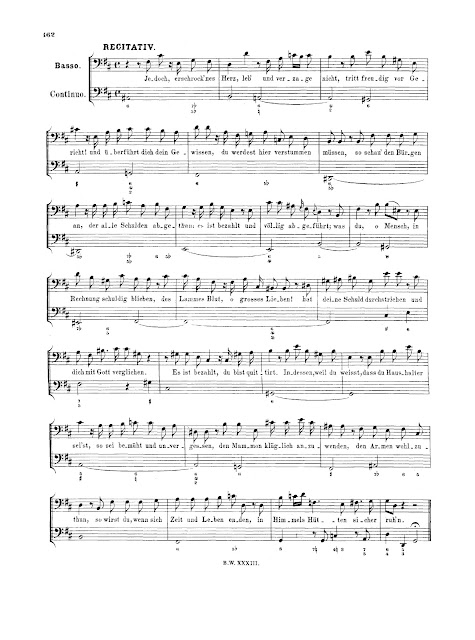CCLXX. BACH, J.S. (1685-1750)
Text by Salomo Franck, from Luke 16:1-9 -- The Parable of the Unjust Steward.
And he said also unto his disciples: There was a certain rich man, which had a steward; and the same was accused unto him that he had wasted his goods.
And he called him, and said unto him: How is it that I hear this of thee? Give an account of thy stewardship; for thou mayest be no longer steward.
I am resolved what to do, that, when I am put out of the stewardship, they may receive me into their houses.
So he called every one of his lord's debtors unto him, and said unto the first: How much owest thou unto my lord?
And he said: A hundred measures of oil And he said unto him: Take thy bill, and sit down quickly, and write fifty.
Then said he to another: And how much owest thou? And he said, A hundred measures of wheat. And he said unto him: Take thy bill, and write fourscore (80).
And the lord commended the unjust steward, because he had done wisely: for the children of this world are in their generation wiser than the children of light.
And I say unto you: Make to yourselves friends of the mammon of unrighteousness; that, when ye fail, they may receive you into everlasting habitations.
**
Intimately scored for four voices, two oboes, strings and continuo, this is a taut, but intense cantata using the above parable as a lesson in the accounting of Judgement Day.
1. Aria (Basso): Tue Rechnung! Donnerwort
2. Recitativo (Tenore): Es ist nur fremdes Gut
This recitative goes into detail about the sin of unjust accounting, with poetic nuance:
This life is not mine own / Which I today on earth am living / Soul, body are a loan / My lot and station are the Father's giving / The goods which God is lending / Are held in trust against the spending / Of more than I can well afford / Ah! woe is me! O Lord / I ask my conscience oft in terror / How stands my reckoning? So full it is of error / I tremble day and night / Lest I default in my accounting / And shudder, cold with fright! / What may I do, my God, to pass Thy judgment? / O harken to my plea / Ye mountains fall, ye hillocks cover me / Take note of my repentance / And so withhold from me Thy awful sentence!
3. Aria (Tenore): Kapital und Interssen
The aria has a dance-like quality -- which seems to delightfully support the gravitas of the text:
Capital and Int'rest payment / All my debits great and small / I must soon account for all / Ev'ry failing, base and sordid / In the Book of God recorded / As if graven deep in stone.
4. Recitativoe (Basso): Jedoch, erschrocknes Herz
A secco recitative with reassuring language, lasting two minutes!
Take heart, and tremble not / Live, nor bemoan thy lot / But joyous meet thy God / If, burdened by thy guilty conscience / Before the judge thy words shall fail thee / Thy Surety is by / Who all thy debts will satisfy / Be not afraid, the debt is wholly paid / Which thou, O man, didst owe to God alone / By Jesus blood, O mighty love! / Of ev'ry wrong committed / In full art thou acquitted / Be not afraid, thy debt is paid! / So, steward, make no slip, but heed thy stewardship / Be sure to use thy talent wisely / Invest it well, nor vainly spend it / In goodly deeds excel / So wilt thou, when thy life on earth is ended / In Heaven's Mansions ever dwell.
5. Aria (Duetto: Soprano, Alto): Herz, zerreiß des Mammons Kette
Bach employs an unusual Renaissance dance -- the canarie -- to underpin this delicious duet.
Rend, my heart, the chains of Mammon / Scatter, hands, the seeds of Grace! / Make ye soft my cruel deathbed / Build in Heav'n my restingplace / There forever loved and cherished / When the Earth in dust has perished.
6. Choral (Coro): Stärk mich mit deinem Freudengeist
By Thine atonement make me strong / Thy love and grace reveal me / Wash Thou my soul of ev'ry wrong / Of ev'ry trespass heal me! / And take me, when it pleases Thee / In Heaven evermore to be / With Thee and Thine Elected.
The only text not by Franck -- this is from a 1588 hymn by Bartholomäus Ringwaldt.
Molly's ancestor?














No comments:
Post a Comment